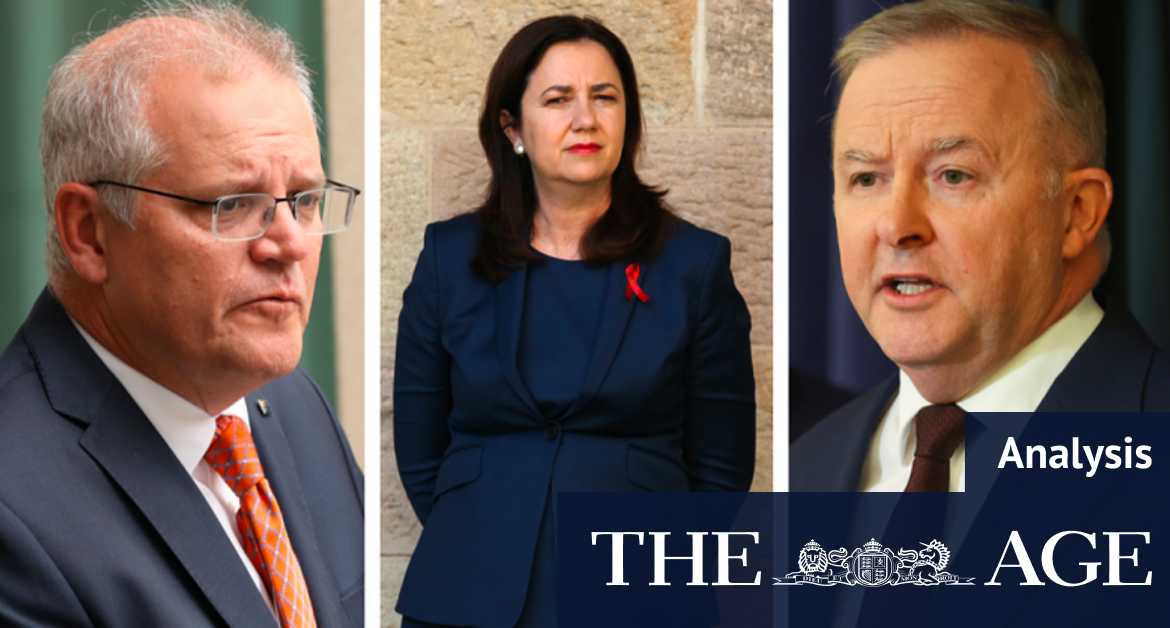At the same time, Greens support swelled in the inner city, where voters repeated trends from Brisbane’s March council election.
The bump in Green support unseated Labor stalwart Jackie Trad at the state election, but it could help the ALP over the line at the federal poll in seats where the Greens finish third.
Mr Albanese will have to lure disillusioned blue-collar workers in central Queensland without alienating inner-city progressives wanting more action on climate change, something former party leader Bill Shorten could not do.
How does he plan to do it? By finding jobs for people in a state where unemployment sits at 7.5 per cent.
“Good jobs, secure jobs, good pay. People know that they are struggling to keep up with the cost of living, they know this is an arrogant government that has taken Queenslanders for granted,” he said.
Eyes on Queensland
The Prime Minister spent four days touring Queensland last month, the centre of his “miracle” victory in 2019. This week, Mr Albanese did the same.
Home to colourful political figures such as Senator Hanson, Kennedy MP Bob Katter and Clive Palmer, Queensland is considered a conservative state by some.
Prime Minister Scott Morrison feeds a lamb near Quilpie in outback Queensland.Credit:Lukas Coch/POOL
Coalition parties have claimed the majority of Queensland seats in 10 of the past 15 federal elections.
Since Paul Keating in 1993, the only Labor leader who secured a majority in the state was Queenslander Kevin Rudd in 2007.
But this does not correlate on a state level.
Labor has held power for 26 of the past 31 years and, in October, Ms Palaszczuk became the first Queensland premier to increase a government’s seat count across three successive elections, cementing herself as the most successful female politician in Australian history.
Not even seasoned Labor operatives expected Ms Palaszczuk to triumph at the ballot box in 2020, with many fearing a hung Parliament.
And nobody expected Mr Shorten to lose the federal election in 2019.
Both results reinforced the reality that Queensland voters like to throw curveballs and both federal leaders are expected to spend a lot of time north of the Tweed in the next few months.
The path to victory in Queensland is clearer for Mr Morrison, who wields the power of incumbency and remains popular in Queensland, helped by Australia’s suppression of the coronavirus.
On his visit to Brisbane last month, the Prime Minister said: “This year is about jobs, and that’s where my focus is.”
The Coalition will likely sandbag key marginal seats, such as Dickson and Longman, to retain its foothold in Queensland.
Putting aside discontent within Labor ranks, the pandemic has pumped the brakes on any momentum Mr Albanese picked up after assuming the party leadership in 2019.
Like many opposition leaders around the world, he has found it difficult to cut through the headlines dominated by border closures, lockdowns, illness and death for the past 12 months.
Labor also faces the daunting task of wresting more seats on the back of its 26.7 per cent primary vote at the past election.
After locking in 38 per cent of the primary vote in October’s state poll, Ms Palaszczuk’s popularity could lift Mr Albanese into the Lodge if any of her shine rubs off on him during his visits to Queensland.
A state where personality matters
Labor’s federal defeat was accelerated in Queensland by the perception the party was championing issues important to Melbourne and Sydney voters.
Speaking in Brisbane on Saturday and Cairns on Monday, Mr Albanese told voters he was “on their side”, a slogan sure to be rolled out at every opportunity before the next election.
“We will have measures and a narrative that’s clearly understood – that we are on the side of jobs, we’re on the side of helping people not be either left behind or held back when it comes to opportunity,” he said on Monday.
Many regional Queenslanders feel they have been abandoned by major parties as they grapple with high unemployment, a transient workforce and lack of opportunity.
And as the pandemic focus shifts from disaster to recovery, voters will be keen to see which major party offers a better path out of recession.
Labor holds just six of the state’s 30 federal seats. If Mr Albanese wants to win favour with those who have turned their backs on the party, he will need to make many more visits between now and polling day.
Lydia Lynch is Queensland political reporter for the Brisbane Times
Most Viewed in Politics
Loading







